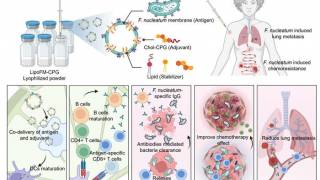Breast Cancer Vaccine Study Launches in West Virginia

A new clinical trial for a novel breast cancer vaccine has enrolled 2 patients in a national study by the West Virginia University (WVU) Medical Center.
The WVU Cancer Institute joins 10 other cancer centers in recruiting 29 patients for this triple-negative breast cancer study.
This trial will examine the recommended biologic dose of a vaccine in combination with pembrolizumab, an immunotherapy drug that is used to fight certain cancers, in the treatment of patients with advanced triple-negative breast cancer (TNBC).
TNBC patients who receive the treatment will be closely monitored for up to 90 days to assess the efficacy of the drug and vaccine combination, said this WVU press release published on December 10, 2019.
This is important cancer news since about 10-20 percent of all breast cancers are TNBC. And, previous studies have shown that TNBC is more likely to spread beyond the breast and more likely to recur after treatment.
“This vaccine works differently than traditional vaccines by helping to stimulate an immune response, which will enable the immunotherapy agent to uncloak and attack the cancer,” Sobha Kurian, M.D., WVU Medicine hematologist/oncologist and primary investigator of the study, said in the press release.
“The immunotherapy by itself may not work against certain cancers because the cancer cells cloak themselves and often cannot be detected by the immune system, but this vaccine may help to overcome this problem.”
“The ability to participate in this study exemplifies the WVU Cancer Institute’s role as a leader in cancer research,” Dr. Kurian said. “The field of breast cancer research is constantly evolving, and we are honored to be at the forefront.”
According to BreastCancer.org, triple-negative breast cancer is cancer that tests negative for estrogen receptors, progesterone receptors, and excess HER2 protein.
This means the growth of the cancer is not fueled by the hormones estrogen and progesterone, or by the HER2 protein.
TNBC does not respond to hormonal therapy medicines or medicines that target HER2 protein receptors. But, other medicines are used to successfully treat TNBC.
Three common features of triple-negative breast cancer are as follows:
- TNBC is considered to be more aggressive and has a poorer prognosis than other types of breast cancer, mainly because there are fewer targeted medicines that treat triple-negative breast cancer.
- It tends to be a higher grade than other types of breast cancer. The higher the grade, the less the cancer cells resemble normal, healthy breast cells in their appearance and growth patterns. On a scale of 1 to 3, TNBC often is grade 3.
- It usually is a cell type called “Basal-like”, which means that the cells resemble the basal cells that line the breast ducts. Basal-like cancers tend to be more aggressive, higher grade cancers, just like TNBCs. Most but not all basal-like breast cancers are triple-negative, but not all TNBC are basal-like.
This TNBC study is sponsored by the National Surgical Adjuvant Breast and Bowel Project Foundation. For more information visit the WVU Cancer Institute.
To date, the Norma Mae Huggins Cancer Research Endowment Fund has raised about $5 million to support clinical research trials for cancer patients in West Virginia. But, to the patients and physicians impacted by those funds, their value is priceless.
Cancer Vaccine and Immunotherapy news published by Precision Vaccinations
Our Trust Standards: Medical Advisory Committee

























